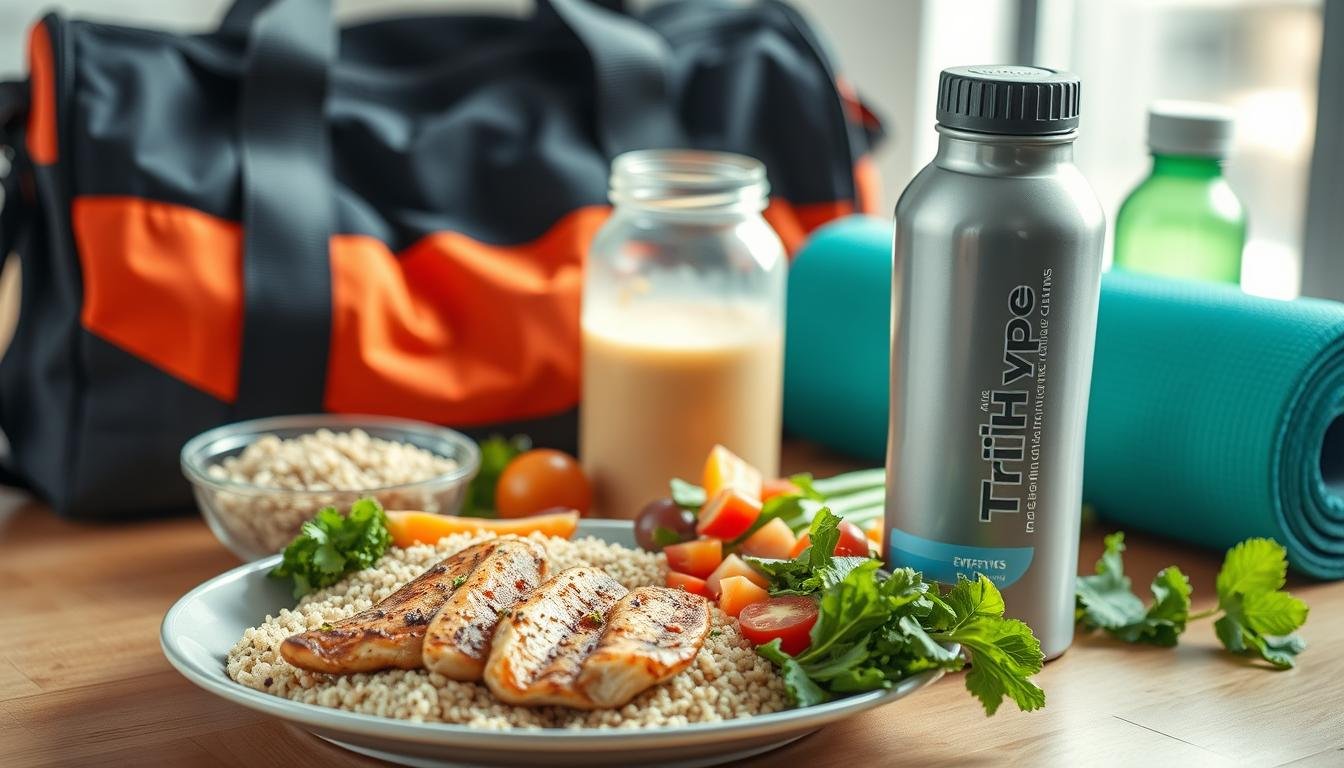Did you know the right food after working out can boost muscle recovery by 23%? This fact is a game-changer for anyone who loves fitness or sports. In this guide, we’ll dive into the key parts of post-workout nutrition. This will help you get the most out of your workouts.
Learning about recovery and refueling is key. It helps you improve your performance and feel great. So, let’s get started on how to fuel your body right after exercise.
Key Takeaways
- Post-workout nutrition is crucial for muscle recovery and performance enhancement.
- Replenishing glycogen stores and protein synthesis are key to maximizing the benefits of your workouts.
- Timing is critical when it comes to refueling, with the “anabolic window” being a crucial consideration.
- Carbohydrates, protein, and electrolytes all play vital roles in post-workout recovery.
- Proper hydration and nutrient timing can help you achieve your fitness goals more efficiently.
The Importance of Post-Workout Nutrition
Eating right after a workout is key for muscle repair and energy refilling. Your muscles tear and lose glycogen when you exercise. The right foods after a workout help fix muscle damage, build strength, and refill glycogen for the next session.
Understanding Muscle Recovery
Exercise causes tiny muscle tears. Eating well after a workout starts the repair, helping muscles grow and get stronger. A mix of protein, carbs, and nutrients is vital for recovery and getting better.
Replenishing Glycogen Stores
Glycogen fuels your muscles during exercise. It gets used up as you work out. Eating carbs and protein after a workout is key to refilling glycogen and getting ready for the next workout.
| Nutrient | Role in Muscle Recovery and Glycogen Replenishment |
|---|---|
| Protein | Aids in muscle repair and growth, supporting overall recovery. |
| Carbohydrates | Replenish glycogen stores, providing energy for your next workout. |
| Electrolytes | Help balance fluid levels and support muscle function. |
Good nutrition after a workout helps your muscles recover and prepares you for the next session. The right nutrients make your workouts more effective.
“Proper post-workout nutrition is essential for maximizing the benefits of your workout and supporting your overall fitness goals.”
Protein Shakes: A Convenient Solution
Protein shakes are a popular choice for getting a lot of protein quickly after working out. They help start the muscle-building process fast. They also give our bodies the amino acids needed for recovery.
One big plus of using protein shakes is how easy they are to use. Unlike meals, which take time, shakes are quick to make and drink. This is great for people who are always on the go and want to build muscle without wasting time.
Protein shakes also give us a precise amount of protein, amino acids, and other important nutrients. By choosing high-quality proteins like whey, casein, or plant-based options, we help our muscles repair and grow. This is key for muscle building and post-workout nutrition.
| Protein Shake Ingredients | Benefits |
|---|---|
| Whey Protein | Rapid absorption, supports muscle growth and recovery |
| Casein Protein | Slow-releasing, helps maintain muscle mass during fasting |
| Plant-based Protein (e.g., pea, soy, or rice) | Suitable for vegetarians/vegans, provides a variety of amino acids |
| Fruits and Vegetables | Adds nutritional value, antioxidants, and fiber |
Adding protein shakes to our post-workout routine helps us meet our muscle-building and recovery goals. It ensures our bodies get the fuel and nutrients they need to perform well.
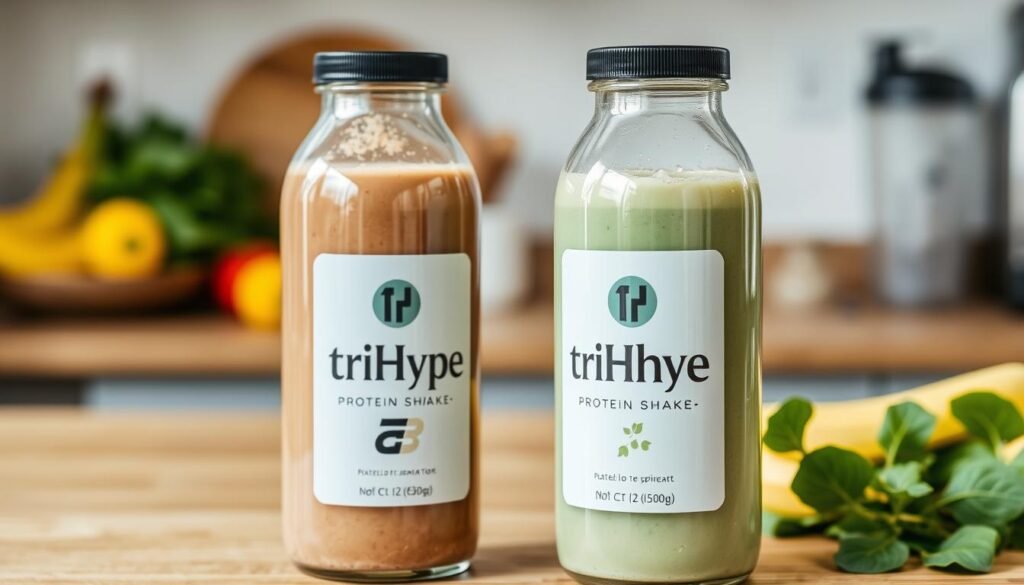
Timing is Key: When to Refuel
Timing is everything when it comes to refueling after a workout. The “anabolic window” is a key period right after exercise. It’s when your muscles are ready to soak up nutrients for repair and growth.
The Anabolic Window
During this window, your muscles are super efficient at absorbing nutrients and building new proteins. What you eat right after working out can greatly affect your muscle recovery and fitness goals. Using the right nutrient timing and post-workout nutrition can give you a big edge in muscle recovery.
- The anabolic window usually lasts 30-60 minutes after your workout.
- Eating a mix of carbs and protein during this time helps refill glycogen and start muscle repair.
- Missing out on this window can lead to poor recovery and less muscle growth.
“The anabolic window is a critical time to maximize the benefits of your workout by providing your muscles with the nutrients they need to recover and grow.”
Understanding the anabolic window and using smart nutrient timing in your post-workout routine can unlock your fitness potential. You’ll see better muscle recovery and growth.
Carb Replenishment for Energy
After a tough workout, your body needs energy back. Carbohydrates are key because they fuel your muscles. It’s important to refill your carb stores to regain energy and help your muscles heal.
Simple vs. Complex Carbs
Not all carbs are the same after a workout. Simple carbs, like fruits and juices, give a quick energy boost. On the other hand, complex carbs, such as whole grains, offer lasting energy and nutrients.
- Simple carbs, or simple sugars, are quickly absorbed. They quickly refill your glycogen stores, giving you a quick energy boost.
- Complex carbs, or starches, digest slower. They provide energy over time, helping you stay strong and recover after your workout.
Mixing simple and complex carbs in your post-workout meal helps you get the most energy. It also supports your fitness goals.
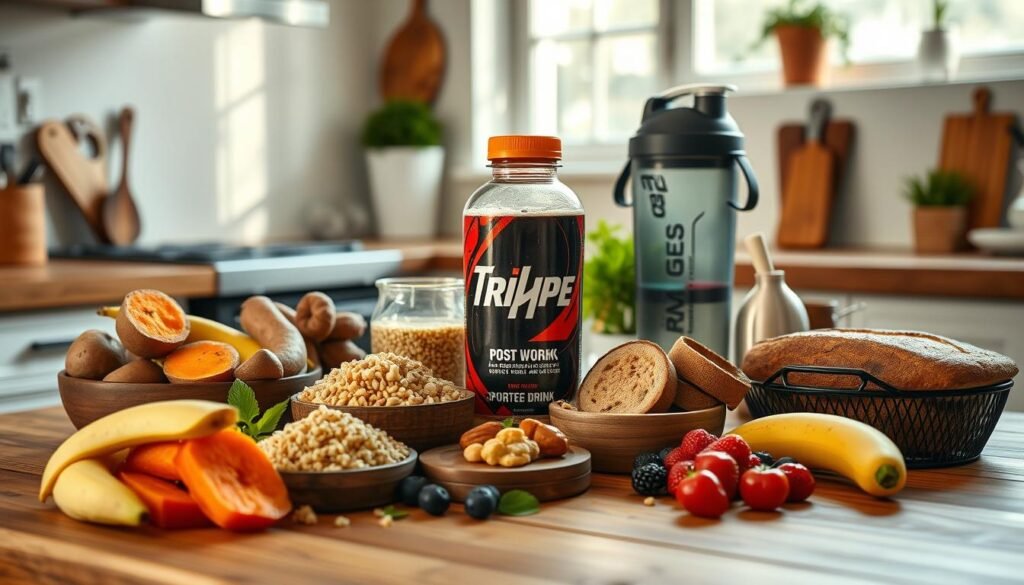
“Proper carb replenishment is essential for restoring your energy levels and supporting muscle recovery after a workout.”
Post-Workout Nutrition for Muscle Building
If you want to build muscle, your post-workout meal should help. It should have high-quality protein, carbs, and amino acids. These nutrients boost muscle growth and help you recover.
Protein is key for fixing and growing muscle after exercise. Choose lean proteins like whey, casein, or plant-based options. They give your body all the amino acids it needs. Carbs, meanwhile, refill glycogen and give energy for muscle repair and growth.
When you eat after working out matters a lot. The “anabolic window” is right after your workout. Eating a balanced meal or shake within 30 to 60 minutes can really help.
| Nutrient | Function | Recommended Intake |
|---|---|---|
| Protein | Repair and rebuild muscle tissue | 20-30 grams of high-quality protein |
| Carbohydrates | Replenish glycogen stores and provide energy | 30-60 grams of complex carbohydrates |
| Amino Acids | Stimulate muscle protein synthesis | Include a blend of essential amino acids |
Good post-workout nutrition is key to reaching your fitness goals. Feed your body the right foods at the right time. This way, you’ll see the best results from your hard work.
“Proper post-workout nutrition is the foundation for building the body of your dreams.”
Hydration and Electrolyte Replacement
Proper hydration and electrolyte replenishment are key for post-workout recovery. We lose a lot of water and minerals like sodium, potassium, and magnesium through sweat. Replacing these helps prevent dehydration, muscle cramps, and fatigue, making recovery smoother.
Signs of Dehydration
It’s important to know the signs of dehydration. Look out for:
- Thirst and dry mouth
- Decreased urine output or dark yellow urine
- Headaches and dizziness
- Muscle cramps and fatigue
- Rapid heart rate and elevated body temperature
If you notice these signs after working out, it’s time to rehydrate and replace your electrolytes. This supports your body’s recovery and overall health.
| Electrolyte | Function | Good Sources |
|---|---|---|
| Sodium | Regulates fluid balance and muscle function | Salts, sports drinks, nuts, seeds |
| Potassium | Supports muscle contractions and nerve function | Bananas, avocados, leafy greens |
| Magnesium | Aids in energy production and muscle recovery | Whole grains, nuts, legumes |
By focusing on hydration and electrolyte replacement in your post-workout nutrition, you support your body’s recovery. This ensures you perform well, both during and after your workout.
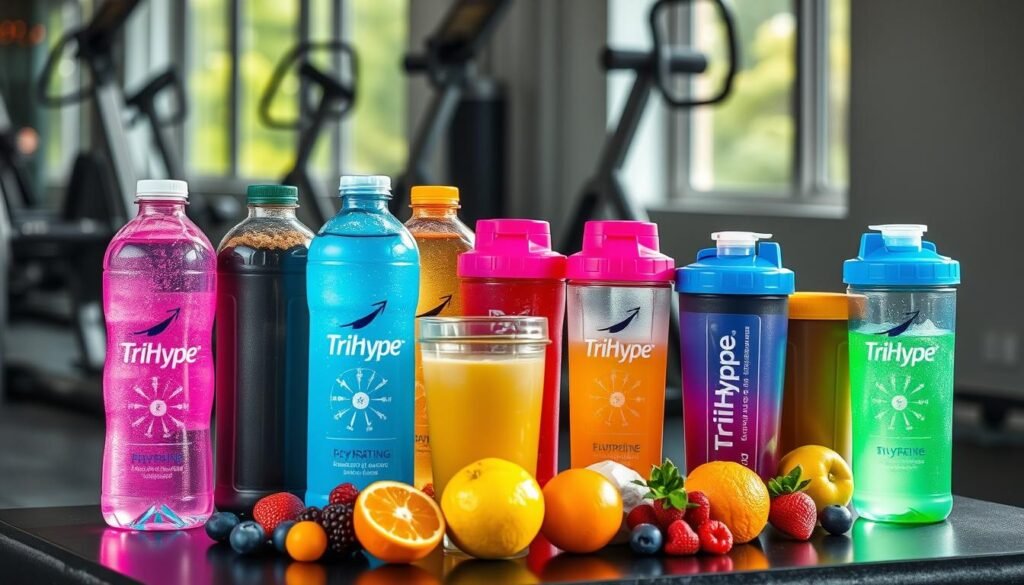
Nutrient Timing: Maximizing Results
Getting the right nutrients at the right time is key after working out. Eating the right mix of protein, carbs, and fats helps our muscles recover and grow. This improves our performance and muscle building.
The “anabolic window” is a crucial time after exercise. It’s when our bodies are ready to absorb nutrients. Using this window well can speed up recovery and help muscles grow.
- Right after working out: Eating carbs and protein quickly helps refill glycogen and start muscle repair.
- 30-60 minutes later: Eating a mix of carbs and protein helps recovery and muscle growth more.
- 2-3 hours after: Eating slow proteins and healthy fats keeps recovery going and supports muscle building.
Matching our food intake with our body’s recovery cycle boosts workout benefits. We see bigger gains in muscle and strength.
| Nutrient Timing | Key Nutrients | Benefits |
|---|---|---|
| Immediate post-workout | Fast-acting carbs, high-quality protein | Replenish glycogen stores, kickstart muscle repair |
| 30-60 minutes post-workout | Complex carbs, lean protein | Further enhance recovery, promote muscle growth |
| 2-3 hours post-workout | Slow-digesting protein, healthy fats | Sustain recovery process, support muscle building |
By timing our nutrients right, we get the most from our post-workout meals. This optimizes recovery and muscle growth.
The Role of Amino Acids in Recovery
Amino acids are key to fixing and growing muscles after working out. They help repair and build muscle tissue. They also help make new proteins.
Essential and Non-Essential Amino Acids
Essential amino acids are needed but can’t be made by our bodies. We get them from food. These include leucine, isoleucine, valine, and others.
Non-essential amino acids can be made by our bodies. They include alanine and others.
Studies show that taking branched-chain amino acids helps reduce muscle damage and soreness. It also improves muscle function and performance after exercise. Taking amino acids can also help with fatigue and soreness from hard workouts.
| Essential Amino Acids | Non-Essential Amino Acids |
|---|---|
| Leucine, Isoleucine, Valine (Branched-Chain Amino Acids) | Alanine, Asparagine, Aspartic Acid, Cysteine, Glutamic Acid, Glutamine, Glycine, Proline, Serine, Tyrosine |
| Histidine, Lysine, Methionine, Phenylalanine, Threonine, Tryptophan, Arginine |
The role of amino acids in muscle recovery is well-studied. They are seen as helpful for recovery and muscle protein synthesis after exercise.
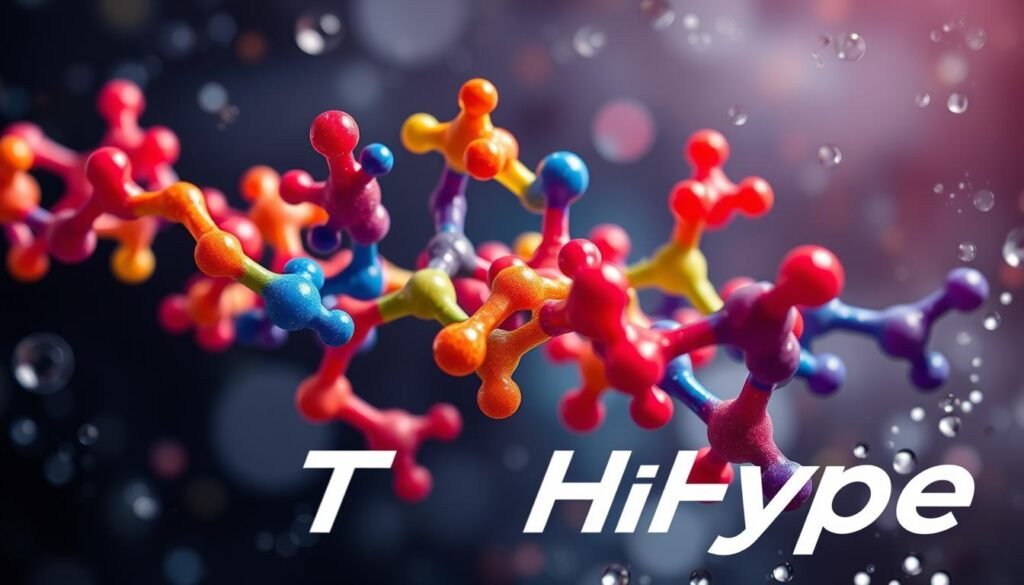
“Supplementation with branched-chain amino acids can decrease muscle damage, alleviate soreness, and enhance muscle function and physical performance after exercise-induced stress.”
Post-workout nutrition for Different Goals
Post-workout nutrition varies based on your fitness goals. Whether you aim for muscle building, fat loss, or better endurance and performance, the right nutrients are key. Tailoring your nutrition can significantly impact your success.
For muscle building, mix protein and carbohydrates. Protein repairs muscles, while carbs refill energy stores. Choose high-quality proteins like lean meats, eggs, or dairy for best results.
Those targeting fat loss should focus on low-calorie, nutrient-rich foods. Include protein, complex carbs, and healthy fats to support fat burning and muscle preservation.
Endurance athletes need more carbohydrates to refill glycogen stores. This helps with quick recovery and prepares for future workouts. Use both simple and complex carbs for optimal refueling.
| Fitness Goal | Recommended Post-Workout Nutrition |
|---|---|
| Muscle Building | High-quality protein, complex carbohydrates |
| Fat Loss | Protein, complex carbs, healthy fats |
| Endurance | Carbohydrates (simple and complex) |
Adjusting your post-workout nutrition to your goals can enhance recovery and performance. This helps you reach your fitness targets and reach your full potential.
Meal Planning for Optimal Recovery
Creating a meal plan for post-workout nutrition is key. It ensures your body gets the right nutrients for recovery and fitness goals. A mix of protein, carbs, and healthy fats fuels muscles, replenishes energy, and boosts well-being.
Balancing Macronutrients
Getting the right macronutrient balance is vital for workout benefits. Here are some tips:
- Include high-quality protein like lean meats, eggs, or plant-based options like lentils or tofu to aid muscle repair and growth.
- Add complex carbohydrates like whole grains, fruits, and vegetables to replenish glycogen stores and provide energy.
- Include healthy fats like avocados, nuts, seeds, or olive oil to support hormone production and body function.
Focus on whole foods and balance these nutrients. This ensures your body recovers and rebuilds after workouts. It supports exercise recovery and long-term fitness goals.
“Proper macronutrient balance is the foundation for effective post-workout nutrition and muscle recovery.” – Registered Dietitian, Jane Smith
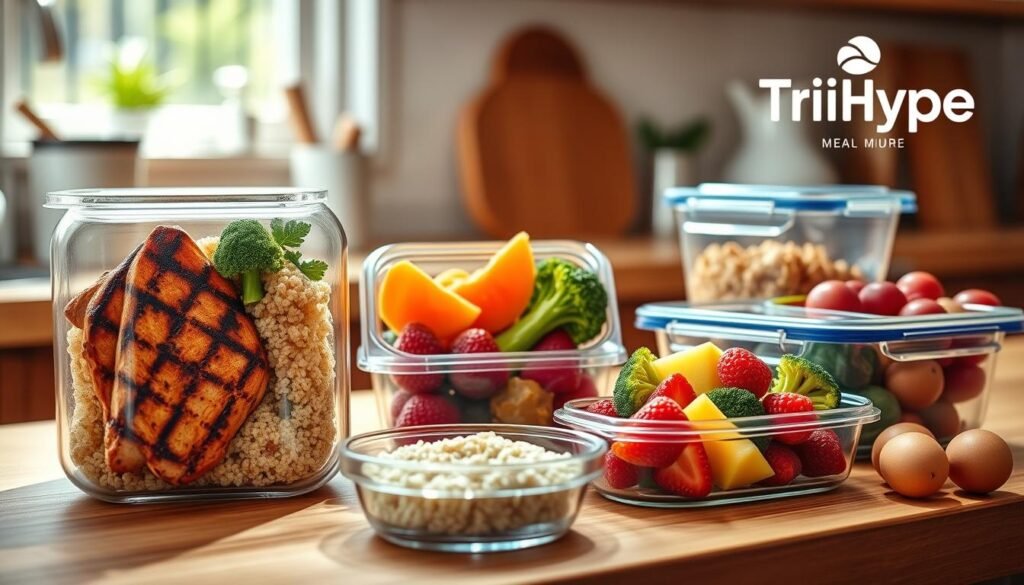
Meal planning for recovery is personal. It depends on your activity level, body composition, and preferences. Finding the right macronutrient balance unlocks your workout’s full potential and supports your health.
Supplements for Enhanced Recovery
A balanced diet is key for post-workout nutrition. But, certain supplements can give you an extra boost. Protein powders, creatine, and BCAAs help fill nutritional gaps and aid in repair and rebuilding.
Protein supplements, like whey or casein, help replace amino acids lost during exercise. They support muscle recovery and growth. Creatine boosts exercise capacity and high-intensity performance, leading to better recovery and training.
- BCAAs (leucine, isoleucine, and valine) are crucial for muscle protein synthesis. They may reduce muscle damage and soreness from exercise.
- Antioxidant supplements, such as vitamin C and E, help reduce oxidative stress and inflammation from intense exercise.
Using post-workout supplements with a balanced diet and proper timing can be very helpful. They help you train harder, recover faster, and reach your fitness goals.
“Proper post-workout nutrition, including the right supplements, can be the key to maximizing the benefits of your hard work in the gym.”
Tailoring Your Supplement Regimen
The right post-workout supplements and dosages depend on your needs, goals, and diet. Always talk to a healthcare professional to create a personalized supplement plan. This plan should match your training and nutrition strategy.
Common Mistakes to Avoid
When it comes to post-workout nutrition, there are several common mistakes. Skipping the post-workout window, neglecting hydration, or eating the wrong nutrient ratios can hinder your progress. These mistakes can slow down your fitness goals.
One big mistake is missing the “anabolic window” after your workout. This window, usually 30 to 60 minutes, is when your muscles are ready to take in nutrients. Skipping it can hurt your muscle building and slow down exercise recovery.
Another mistake is not paying enough attention to hydration. When you exercise hard, you lose a lot of fluids and electrolytes. You need to replace them to keep your muscles working well and avoid dehydration.
- Not getting the right mix of macronutrients (protein, carbs, and fats) can also mess up your post-workout nutrient timing. This can affect your muscle growth and recovery.
- Depending too much on supplements or processed foods instead of whole foods can leave you missing out on important vitamins, minerals, and antioxidants. Your body needs these to recover well.
By avoiding these common mistakes and adjusting your post-workout nutrition routine, you can achieve better results. This will help you make the most of your gym workouts.
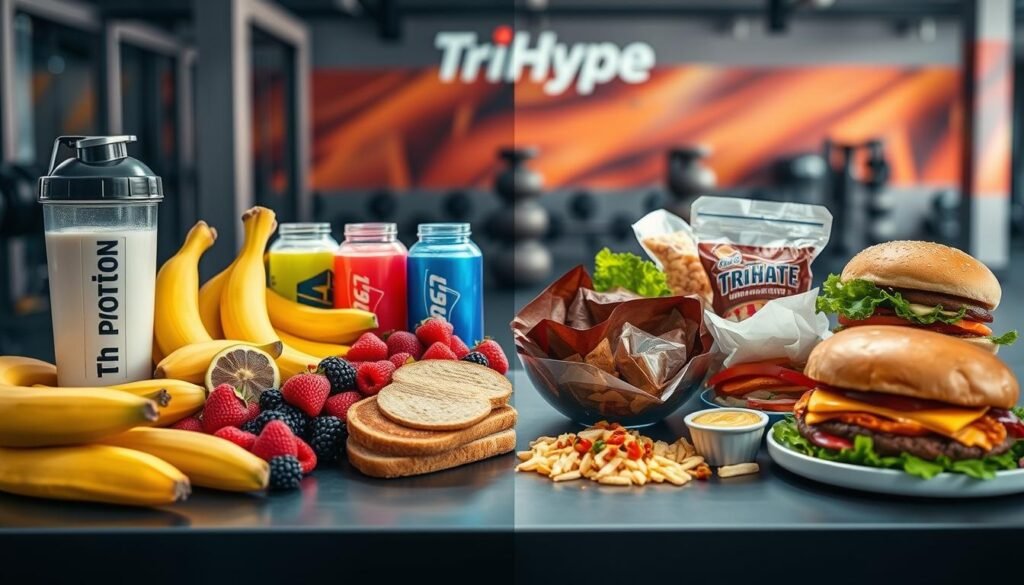
“The key to effective post-workout nutrition is to provide your body with the right nutrients at the right time to support muscle recovery and growth.”
Tracking Progress and Adjusting Your Plan
It’s key to track your progress and tweak your post-workout nutrition plan to hit your fitness goals. Keep an eye on body composition, strength, and how you feel overall. This helps tailor your nutrition to meet your specific needs and goals.
Tracking progress helps you see what’s working and what’s not. This insight lets you make smart changes to your nutrition. It helps you get the most out of your recovery and muscle building.
Set Measurable Goals
Start by setting clear, measurable goals for your nutrition after workouts. Goals might be to build muscle, lose fat, or boost athletic performance. Having specific goals helps you track your progress and make informed changes to your nutrition plan.
Utilize Progress Tracking Tools
- Body composition analysis (e.g., body fat percentage, lean muscle mass)
- Strength and performance metrics (e.g., lift weights, endurance)
- Recovery indicators (e.g., sleep quality, energy levels, muscle soreness)
Tracking these metrics regularly gives you insights into your nutrition’s effectiveness. It helps you refine your strategy as needed.
Be Flexible and Adaptable
Your nutrition plan should be flexible. As your body changes and goals shift, be ready to adjust your plan. Stay open to trying new things to improve your recovery and performance.
| Metric | Baseline | Current | % Change |
|---|---|---|---|
| Body Fat % | 18% | 15% | -16.67% |
| Lean Muscle Mass | 150 lbs | 160 lbs | +6.67% |
| Bench Press | 225 lbs | 240 lbs | +6.67% |
By tracking your progress and adjusting your nutrition plan, you’ll reach your fitness goals. You’ll optimize your recovery and muscle building efforts.
“The only way to do great work is to love what you do. If you haven’t found it yet, keep looking. Don’t settle.” – Steve Jobs
https://trihype.com/effective-injury-prevention-tips-for-a-safer-life/
Effective Injury Prevention Tips for a Safer Life
Conclusion
Post-workout nutrition is key to reaching our fitness goals. It helps us recover, refuel, and get better results. This is how we unlock our full potential.
This guide has shown us how to improve our post-workout nutrition, exercise recovery, and muscle building. By following these tips, we can boost our performance and reach our goals.
We hope you’ll use what you’ve learned to make post-workout nutrition a big part of your fitness plan. By focusing on recovery and refueling, we can do more than we thought possible. We’ll become healthier, stronger, and more resilient.
